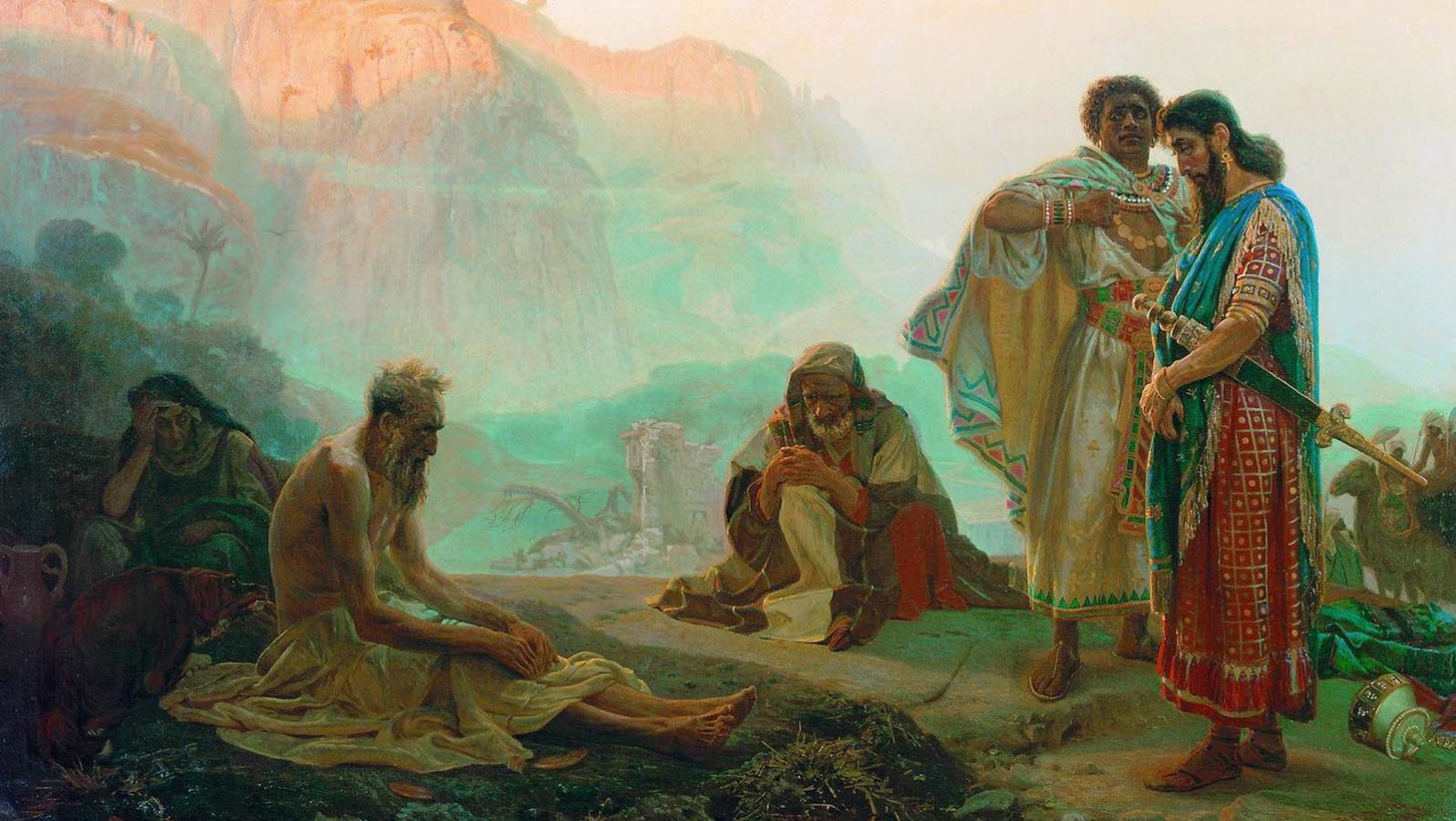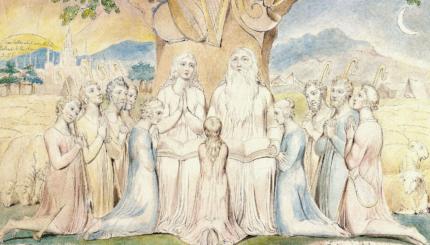Rabbi Harold Kushner, in his classic When Bad Things Happen to Good People, wrote that there really is only one religious question, and that is: “If God is good, then why is life so hard?” The basic religious paradox of why a loving God would construct a world so full of suffering is referred to as the problem of theodicy. No book in the Bible takes up theodicy’s challenge with greater power than the moving and enigmatic story of Job.
Read the full text of the Book of Job in Hebrew and English on Sefaria.
On close reading, Job is almost two books in one — one written in prose, and the other in poetic verse. The Book of Job (found in the Ketuvim, or Writings, section of the Bible) begins and ends with the prose text. Sandwiched between these bookends, the middle chapters are entirely written in poetry. These two formats aren’t just strikingly different in style: The content within them provides startlingly different responses to the question of suffering.
The Prose Sections of Job
The prose section of Job includes the first two chapters, as well as the final portion of the book’s last chapter. Read together, they form a simple, coherent narrative. Job is a wholly good man who loses everything – his health, his wealth and even his family. In the face of all of that tragedy, he remains steadfast. Job’s saintly acceptance verges on extraordinary. When he learns that his home has collapsed, killing his whole family, Job responds with prayer equanimity: “The Lord gives and the Lord takes away. Blessed is the name of the Lord” (Job 1:21). (This line is often incorporated into the liturgy at Jewish funerals).
With your help, My Jewish Learning can provide endless opportunities for learning, connection and discovery.
In the end, Job’s endless faith is rewarded by God, who gives him “twice what he had before” (Job 42:10). The prose story of Job has a happy ending: “Job lived one hundred and forty years, seeing four generations of children and grandchildren. He died old and contented” (Job 42:16).
The Poetic Section of Job
The poetic section of the Book of Job, which makes up the majority of the text (Job 3-42), is much more theologically ambiguous. This portion is written as a series of impassioned speeches delivered entirely in verse. It presents a hero who is not nearly so resigned to his fate. Instead, Job tenaciously insists on the unfairness of his suffering and repeatedly challenges God to show cause for why this is happening to him. He exclaims, “God has wronged me. He has besieged me. I cry out, but get no response. I shout out, but can get no justice” (Job 19:6-7).
Much of the drama in this section comes from the interaction between Job and his four supposed friends: Eliphaz, Bildad, Zophar and Elihu. These men ostensibly come to comfort him, but wind up first gently suggesting and eventually forcefully arguing that God’s justice (or lack thereof) is not for mere human beings to question. Eliphaz exclaims: “What innocent man has ever perished? Where have the upright been destroyed?” (Job 4:7). Bildad goes further, “If your children sinned against God, then God killed them for their transgression!” (Job 8:4). In other words, these “friends” bring with them a message of condemnation. Since there is no punishment without sin, they argue, then whatever your fate, you have brought it on yourself!
Finally, God emerges from the storm clouds to settle the score. Based on the prose version of the text, one might expect that God will castigate Job for his arrogance and congratulate the friends for their piety, yet God does no such thing. After first giving a lengthy speech about the mysteries of the universe and humanity’s limited capacity for understanding, God concludes that it was Job, not the friends, who correctly understood the situation. Job’s suffering was unjust, and Job’s protests were valid!
Job, the Protester vs. Job, the Stoic
In the prose text, the reader is left with no questions: God is entirely righteous, and suffering is to be born in reverent silence. In the poetic text, however, we have no easy answers. While God does not give a reason for the suffering of the innocent, God affirms that the relationship between suffering and sin is tenuous at best, and that our fate is not necessarily explainable by our actions. This led the Rabbis of the Talmud centuries later to conclude: “It is beyond our ability to explain the prosperity of the wicked, or the suffering of the righteous” (Mishnah Avot 1:15).
By presenting the reader with two models — stoic resolve and impassioned resistance — we are invited to see both as genuine religious responses to life’s unfairness. At times in our own struggles, we may move between these worlds, sometimes seeking equanimity and sometimes crying out. In this way, the Book of Job is one of the Bible’s most human books, reflecting an internal struggle that most of us have felt, without offering simple directives.
Who Wrote Job and When?
The Book of Job itself gives no comment about its authorship or date. Linguistic clues and allusions suggest that it was written after the Babylonian Exile, during the Persian Period (6th-4th centuries BCE). However, given the highly stylized, literary Hebrew of Job, considered to be the most complex of any book of the Bible, it is very difficult for scholars to date definitively. Furthermore, we do not know whether one author wrote both the prose and poetic versions of Job, or whether they are the product of different hands later woven into a single text.
Job’s mysteries, it seems, continue to defy easy answers.
Talmud
Pronounced: TALL-mud, Origin: Hebrew, the set of teachings and commentaries on the Torah that form the basis for Jewish law. Comprised of the Mishnah and the Gemara, it contains the opinions of thousands of rabbis from different periods in Jewish history.



